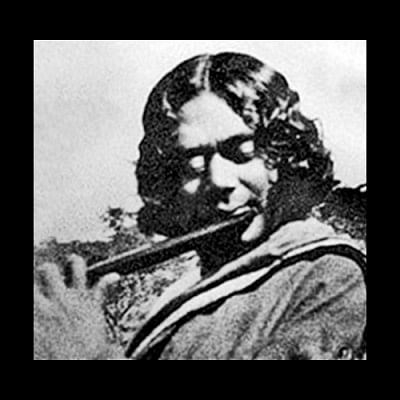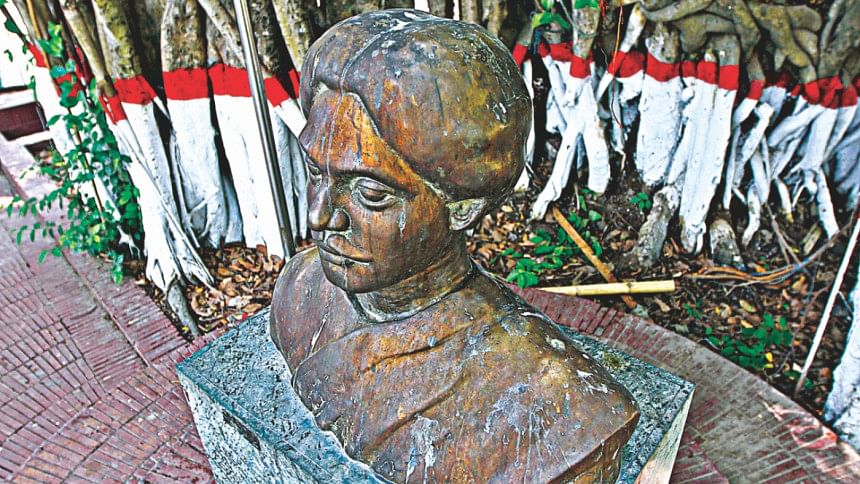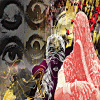Nazrul study in neglect at DU centre

Although many seminars and discussions are going to be held to mark the 117th birth anniversary of National Poet Kazi Nazrul Islam today, only a handful of research has been done on the poet in the last few decades.
Other than the studies done by some individuals, the amount of research conducted on Nazrul by the Dhaka University's Nazrul Gobeshona Kendra (Nazrul Research Centre) is negligible.
The rebel poet of Bangla literature was born at Churulia in Burdwan district of West Bengal on this day in 1899 (the 11th of Jaishtha). In 1972, Nazrul was brought to Bangladesh by Bangabandhu Sheikh Mujibur Rahman and was honoured as the national poet of the country.
Research activities of the Nazrul Gobeshona Kendra have been negligible since its inception in 1989. Even the research centre, located on the first floor of Arts Building (Kala Bhaban), itself is in a sorry state, and one would have to make some efforts to find it even.
Director of the centre, Soumitra Sekhar, professor of Bangla department at Dhaka University, said the centre was established by Nazrul-lovers with a vision to initiate research on Nazrul through which people could learn more about him and his work.
Although there are researches on Nazrul on an individual level, he said, very few notable research work or activities were conducted at the centre.
According to Sekhar, a collection of work on Nazrul was published by the Kendra during Prof Emeritus Rafiqul Islam's tenure, the time when the centre was established. However, the copy of the book could not be found anywhere.
“The book could not be preserved or protected because the Kendra has no permanent office,” he said. There is a shortage of staff at the centre as well.

The current location of the Kendra is actually Sekhar's faculty room, allotted to him as a teacher of DU's Bangla department.
Sekhar said the centre had been running without a fixed office, employees and research assistants since 1989.
“There are no records of any work done by any directors, who succeeded Rafiqul Islam, in the Kendra,” he said, noting that their work, if any, might be lost due to a lack of storage facility. He said a director only has a three-year tenure there.
In reply to whether students ever showed interest in Nazrul research, Sekhar pointed out that there was no full course on Nazrul at DU's Bangla department until 2013.
The department started its journey in 1921, but until 2013, Nazrul studies constituted only 16.4 out of 1,800 marks required for graduation in Bangla, he said.
Currently, there is a 100-mark course on the national poet.
After Rafiqul Islam and Karunamoy Goswami, very little notable research on Nazrul had been done by the DU, the largest university and research centre of the country, according to Sekhar.
“The problem is not with funds,” he said, citing how he utilised the annual Tk 1 lakh budget for the centre since he became director in 2014.
“A seminar was organised by the Kendra last year on the 11th of Jaishtha. Nazrul's granddaughter Anindita Kazi was invited to Bangladesh and honoured,” he said.
A research journal would be published by the centre in August, Sekhar mentioned.
“We will also hold a workshop on teaching research methodology to potential researchers at an affordable fee,” he said.
“It is not just Dhaka University,” said Sekhar, “As much as we talk about Nazrul, we do not practise his ideals...”
In his last speech -- “Jodi ar banshi na bajey” (if the flute does not play again) -- at a rally in Kolkata in 1942, Nazrul said, “When I will be no more, perhaps big seminars will be held on that day, countless praises, poems will be written about me. Patriot, sacrificing, valiant, rebel -- adjectives after adjectives. Pounding their fists, speakers after speakers will break tables.”
Urging all not to attend such ceremonies, he said, “If you can, sit quietly and remember any unwritten moment of my life.”
The time has come to pay heed to the poet's advice and research on his philosophy of life.

 For all latest news, follow The Daily Star's Google News channel.
For all latest news, follow The Daily Star's Google News channel. 








Comments